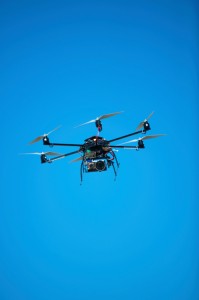By Dr. Vincent Giordano, Program Director, Criminal Justice at American Public University
Patrolling high-crime areas in major cities is costly and dangerous. Therefore, it is easy to understand why the use of unmanned drones as a new method of providing a police presence has recently been discussed by police departments across the U.S.
With the 2012 passing of the FAA Modernization and Reform Act, which contains a provision known as the Drone Act, law enforcement agencies 
For the general public, this means that there can no longer be an expectation of privacy in public places. “Right now, law enforcement can use drones to survey anything that is visible to the human eye without a warrant, said Amie Stepanovich, counsel at the Electronic Privacy Information Center.
Basically stated: Don’t do anything outside your house that you don’t want others to see.
“Unmanned aircrafts already are finding homes in local police departments and other law enforcement agencies. The specific provision in the Drone Act authorizing law enforcement and other government-funded entities to use drones now…mandates aircraft must weigh 25 pounds or less, cannot be operated higher than 400 feet above the ground or near airports and must remain within naked eyesight of the operator,” according to Josh Solomon in the article Drones Taking Off in U.S. Skies.
With these rules, a patrol car could sit at the edge of a high crime area and monitor large geographical regions, as long as the drone remains in sight of the officer. This eye in the sky provides greater assessment of these areas at a lesser risk to the officers involved.
Recently, unmanned aerial and ground-based drones were used to patrol the Republican National Convention in Tampa, Fla. In response to the use of drones, the cyber activist group Anonymous called for the outright destruction of security cameras and barriers at the convention.
Florida-based United Drones is deploying two different vehicles to patrol the streets and skies of the Bay area. The Aether Aero is a small helicopter that can fly up to 4,000 feet for up to four hours and is equipped with 109x optical zoom camera. The Wrath, a ground based vehicle, will be deployed to provide backup assistance to security forces as needed. The Wrath can reportedly move at speeds up to 65 miles per hour and can climb over most terrain.
In response to the use of drones at the convention in Tampa and general concerns throughout the state, Governor Rick Scott signed into law SB92 which bans law enforcement from using drones without a warrant or threat of a terrorist attack. It further prohibits the use of data collected by drones to be used as evidence in courts unless the federal government determines there is credible threat of a terrorist attack.
Despite the Florida law, the public is not safe from technological intrusions. The Florida law does not totally outlaw the use of drones; in the case of the Republican convention, the use of drones would still have likely been permitted based on the guidelines in the law. Other states have less defined restrictions on the use of drones to assist law enforcement. Arkansas, Utah, Washington, and Texas all use drones to help investigate crime or look for missing persons. Additionally cameras that use face recognition technology and red light cameras have become common place. The question comes at what price are we willing to give up our civil liberties in order to become more effective crime fighters?
About the Author: Dr. Vinnie Giordano Ph.D, CAP, CCJAP- obtained his bachelor’s in liberal arts from Long Island University/ C.W. Post with a specialization in political science. He then went on to achieve his Master of Science in Criminal Justice from Florida Metropolitan University, and another Master of Science in Criminal Justice from the University of Cincinnati. Dr. Giordano obtained his Ph.D. in Human Services with a specialization in Criminal Justice from Capella University. Before coming to APUS as a full-time employee, Dr. Giordano worked in the field of substance abuse and behavioral health for 13 years where he worked as a substance abuse counselor in a Department of Corrections-funded youthful offender program. There he maintained positions in counseling and supervising for a 28-day residential and aftercare program, and as the Administrator of Juvenile Services at the Pinellas Juvenile Assessment Center.